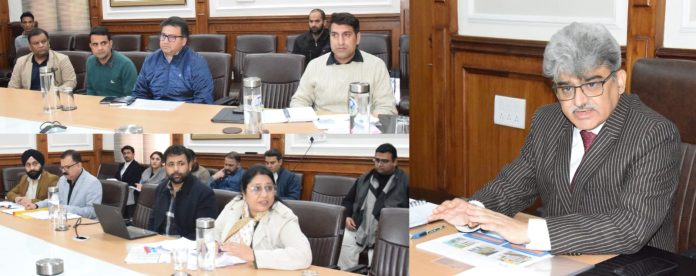JAMMU: Chief Secretary, Atal Dulloo, today chaired a meeting of Rural Development Department (RDD) to review progress on implementation of Swachh Bharat Mission-Grameen (SBM-G) across the Union Territory.
During the meeting, the Chief Secretary emphasized the importance of regular monitoring of community assets created by the Rural Sanitation Department. He directed the department to devise a robust mechanism for tracking the functional status of these assets including community sanitation complexes, compost pits, segregation sheds, soak pits and drainage facilities.
He further instructed that ground level staff be tasked with uploading of geo-tagged photos and videos of these assets periodically to ensure updated information is readily available to the authorities.
Dulloo called for making budgetary provisions to establish Gobardhan units in all districts and stressed their optimal utilisation to benefit rural communities. He highlighted the need for a comprehensive Operations and Maintenance (O&M) policy to ensure sustainable management of community sanitation assets and encouraged active public participation in their upkeep. He stated that if these assets are made greatly beneficial for the public they would in turn find it interesting to adopt them for proper management.
The Chief Secretary underscored the significance of establishing faecal sludge treatment facilities in various districts, deeming them crucial for maintaining clean and ambient rural surroundings. He also advocated creation of carbon-neutral panchayats across the Union Territory and urged the department to certify such initiatives to validate their impact.
He directed the department to further strengthen the IEC activities in the UT for affecting the much required behavioural change among the population. He advised for consistent promotion of SBM-G initiatives in the region. He told them to focus on disseminating success stories, raising awareness and ensuring regular engagement with stakeholders to sustain momentum of the mission thereby guaranteeing its success in the UT.
Secretary, RDD, Aijaz Assad, provided an overview of the department’s achievements under the Swachh Bharat Mission-Grameen. He informed the meeting that the Government of India has approved ₹245 crore as the Annual Implementation Plan (AIP) for 2024-25, supplemented by contributions from the UT.
Director General of Rural Sanitation, Anoo Malhotra, apprised the meeting of significant progress made during the current financial year. She reported that all 6,650 villages in J&K have been declared ODF+ Model, with 81% (5,407 villages) approved by third-party verification. The meeting was apprised that under SBM-G, community assets created included 13,879 compost pits, 2,800 segregation sheds, and 7,600 segregation bins for solid waste management.
Additionally, 13,870 community soak pits and 2,800 drainage facilities have also been established for greywater treatment, along with numerous individual assets benefiting households across the UT.
Regarding utilisation of funds received so far, it was disclosed that of the total available funds of Rs131.15 crore, Rs124.70 crore have been utilised, leaving a balance of just Rs 6.45 crore in SNA. It was revealed that efforts are underway to complete 135 plastic waste management units across the blocks of J&K soon.
It was reiterated that the RDD is committed to ensure the success of SBM-G and improving the quality of life in rural areas. The stakeholders were urged to work collaboratively for effective implementation of this significant programme in the length and breadth of the UT.


